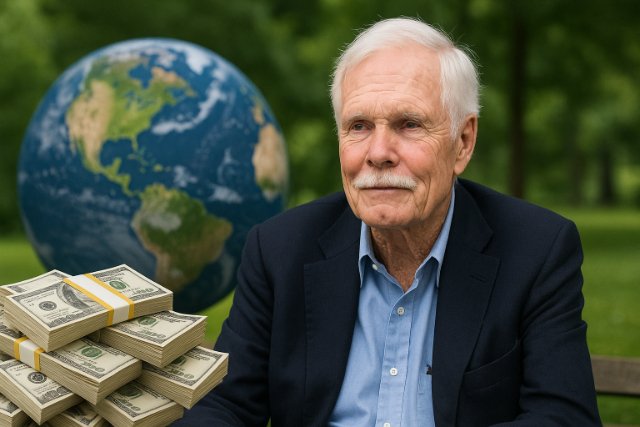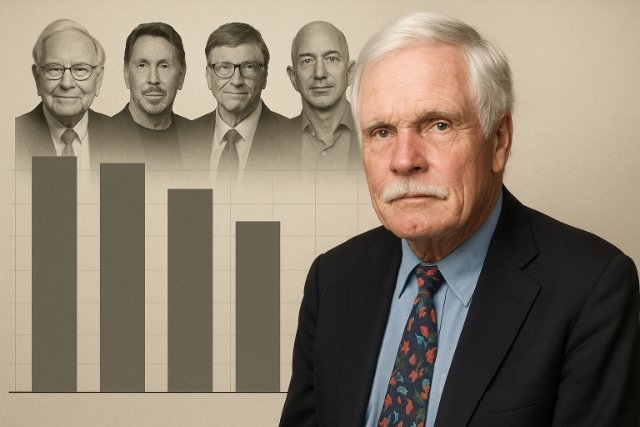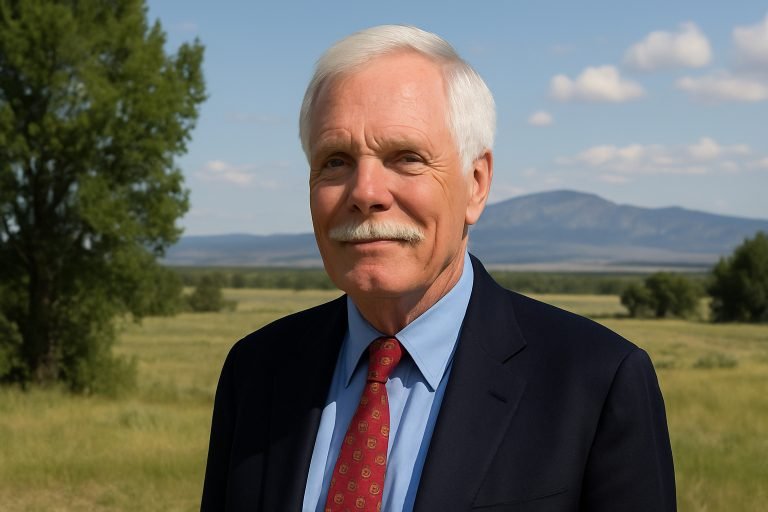Ted Turner is one of the most influential figures in American media and philanthropy. Best known as the founder of CNN, Turner Broadcasting System (TBS), and TNT, he reshaped the way people consume television. Over decades, he expanded his wealth through media empires, savvy acquisitions, and one of the largest private land portfolios in the United States. At the same time, Turner has given away billions to charitable causes, pledged his fortune through The Giving Pledge, and prioritized conservation. Today, Ted Turner’s net worth is estimated at between $2.2 and $2.8 billion, depending on the source, reflecting both his massive successes and costly setbacks.
This article examines how Turner built his fortune, the turning points that shaped it, his vast land ownership, his philanthropy, and how his wealth compares to other billionaires of his era.
What is Ted Turner’s Current Net Worth Estimate?
Ted Turner’s current net worth in 2025 is generally estimated between $2.2 billion and $2.8 billion, with slight variations across financial publications. Forbes typically lists him near the lower end of this range, while business aggregators like Bloomberg and Goodreturns occasionally cite higher estimates based on asset appreciation and land values.
Different numbers arise because Turner’s assets are a mix of liquid investments, private land, and philanthropic commitments. Unlike billionaires heavily invested in publicly traded companies, Turner’s wealth is tied to holdings that are difficult to value precisely, such as conservation land and media royalties.
Forbes and Bloomberg factor in the illiquid nature of his ranches and forests, valuing them conservatively. Other outlets sometimes inflate figures by assigning higher speculative valuations to his land holdings or by ignoring the billions he has donated.
Which Major Sources Report the Figure?
- Forbes Billionaires List: Around $2.3 billion (2025 estimate)
- Bloomberg Billionaires Index: Typically aligns between $2.2–$2.5 billion
- Goodreturns / Wealth Aggregators: Sometimes cite higher ranges up to $2.8 billion
- Wikipedia: Reflects consensus numbers, usually citing Forbes as primary reference
cWhy Do Different Sources Give Different Numbers?
Discrepancies occur because of:
- Valuation of land – Turner owns ~2 million acres, which may be worth anywhere from $2–$4 billion depending on appraisal method.
- Impact of philanthropy – He has given away over $1 billion, significantly reducing his liquid wealth.
- Fluctuation in investment income – Royalties and investments tied to WarnerMedia assets shift over time.
- Private company holdings – Turner Enterprises manages ranching, hospitality, and environmental businesses not fully disclosed to the public.
How Did Ted Turner Build His Fortune?
Ted Turner’s journey to billionaire status began with his father’s billboard advertising company. After inheriting Turner Advertising in the 1960s, he aggressively expanded into broadcasting, eventually revolutionizing global media.
What Role Did Turner Advertising, Tbs, Tnt, Cnn Play?
- Turner Advertising: Foundation of his empire. He inherited the company at age 24 after his father’s death.
- Turner Broadcasting System (TBS): Purchased a struggling UHF station in Atlanta (WTCG), transformed it into a “superstation” available nationwide.
- CNN (Cable News Network, 1980): First 24-hour news channel, which redefined journalism and global news delivery.
- TNT (Turner Network Television, 1988): Expanded his cable influence by focusing on movies and drama.
These ventures positioned him as a media innovator, drawing advertising dollars and cable carriage fees, which fueled his rapid wealth growth.
How Did His Acquisition of Mgm’s Library Contribute?
In 1986, Turner purchased MGM/UA Entertainment Co. primarily for its film library, including thousands of classic films. Though he later sold the studio back, he retained the valuable library rights, which supplied constant content for his networks and generated licensing income for decades.
The MGM acquisition solidified Turner Broadcasting’s dominance and created one of the most lucrative media asset portfolios in history.
What About His Land and Ranch Holdings?
By the 1990s, Turner diversified into land acquisition, becoming one of the largest private landowners in America.
His ranches and bison herds are spread across New Mexico, Montana, Nebraska, and other states. These holdings serve multiple purposes:
- Ranching and eco-tourism businesses
- Conservation and biodiversity efforts
- Long-term wealth preservation through appreciating real estate
What Inflection Points Caused Major Gains or Losses in His Net Worth?
Ted Turner’s wealth experienced dramatic highs and lows, tied largely to corporate mergers and philanthropic choices.
How Did the Time Warner / Aol Merger Affect Him?
In 1996, Time Warner acquired Turner Broadcasting in a deal that made Turner a top shareholder. His net worth soared to over $10 billion during the dot-com boom. However, the 2000 AOL-Time Warner merger turned disastrous as AOL stock collapsed. Turner lost billions, eventually stepping away from an active role at Time Warner.
What Were the Effects of Divestments, Sales, or Declines?
Turner sold down significant portions of his stock to diversify and cover debts. The decline in Time Warner’s share price cut his wealth by more than half. He also exited leadership roles, reducing his direct influence in the media industry.
What Has Philanthropy Taken Away?
Turner’s decision to donate $1 billion to the United Nations Foundation in 1997, plus further commitments to environmental and health causes, reduced his net worth but cemented his legacy as one of the most generous philanthropists of his generation.
How Much Has Ted Turner Given Away and What is His Philanthropic Impact?

Turner’s philanthropy is central to understanding his net worth today.
What Are His Large Donations and Foundations?
- $1 billion pledge to United Nations Foundation – Fulfilled across installments.
- Turner Foundation – Focuses on environmental causes, population issues, and conservation.
- Nuclear Threat Initiative – Co-founded to reduce nuclear weapons proliferation.
- Captain Planet Foundation – Promotes environmental education for children.
What is the Giving Pledge and How Does He Participate?
Ted Turner was among the earliest billionaires to commit to The Giving Pledge, promising to donate at least half his fortune to charitable causes during his lifetime or upon his death. His early $1 billion donation remains one of the largest philanthropic commitments ever made by a media figure.
How Do Ted Turner’s Land Holdings Affect His Wealth and Legacy?
Ted Turner’s land holdings play a central role in both his financial wealth and his lasting legacy. As one of the largest private landowners in the United States, Turner controls over 2 million acres across states such as Montana, New Mexico, Nebraska, and South Dakota. These vast holdings contribute to his wealth not only through their intrinsic value but also through the cattle ranching and conservation initiatives they support.
Beyond financial impact, Turner’s landownership is deeply tied to his legacy. He has long been a pioneer of large-scale conservation, using his properties to restore bison herds, protect endangered species, and preserve ecosystems. Many of his ranches are managed with sustainable practices that blend profitability with environmental stewardship, reinforcing his reputation as a philanthropist and conservationist.
Turner’s land strategy differs from other billionaires in that it emphasizes ecological restoration rather than purely commercial development. His holdings serve as living proof of his belief that wealth should be leveraged for environmental good. As a result, his legacy is not only measured in media empires and business achievements but also in the enduring impact he leaves on conservation, biodiversity, and responsible land management.
What Land Does He Own, Where, and How is It Used?
Turner owns approximately 1.9–2 million acres, making him the second-largest private landowner in the U.S. His holdings include:
- Vermejo Park Ranch, New Mexico (largest at ~590,000 acres)
- Flying D Ranch, Montana (~113,000 acres)
- Blue Creek Ranch, Nebraska
- Numerous smaller properties across multiple states
The land is used for:
- Bison ranching (largest private herd in the world, ~50,000 bison)
- Eco-tourism resorts (Ted Turner Reserves)
- Conservation and rewilding projects
What is Their Ecological / Economic Value?
Beyond economic value, Turner’s lands are critical for conservation. They preserve habitats, protect biodiversity, and contribute to climate resilience. From an economic perspective, these lands are conservatively worth $2–$4 billion, though liquidity challenges make exact valuation complex.
How is Ted Turner’s Wealth Viewed in Comparison to Other Billionaires of His Era?

Ted Turner’s wealth is often viewed differently from that of his billionaire peers of the late 20th century, such as Bill Gates, Warren Buffett, or Rupert Murdoch. While those figures concentrated their fortunes in technology, finance, or media empires that continued to scale globally, Turner’s wealth peaked in the 1990s with the rise of CNN and then shifted toward land holdings, conservation, and philanthropy. Compared to peers who accumulated staggering net worth through compounding tech-driven growth, Turner is seen less as one of the world’s richest men today and more as a visionary who traded traditional billionaire status for influence in environmental stewardship and cultural legacy, making his wealth notable for its purpose rather than its size.
Who Are His Peers and How Do Their Fortunes Compare?
- Rupert Murdoch – Still controls major media assets (News Corp, Fox Corp), net worth ~$19 billion.
- John Malone – Known as “Cable Cowboy,” net worth ~$11 billion.
- Sumner Redstone (ViacomCBS) – Net worth peaked ~$6 billion before passing in 2020.
Turner’s decision to donate massive sums and step away from active control means his wealth lags behind his peers, but his influence is often considered greater.
How Has Inflation / Asset Price Changes Shifted His Ranking?
In 1999, Turner was among the top 20 richest Americans. Today, inflation, philanthropy, and asset sales have pushed him outside the top ranks, though his land portfolio remains among the most significant in U.S. history.
What Criticisms, Myths, or Misunderstandings Exist Around Ted Turner’s Net Worth?
Criticisms and misunderstandings about Ted Turner’s net worth often stem from the assumption that his fortune is as liquid and accessible as other billionaires’, when in reality much of it is tied up in vast land holdings, ranch operations, and conservation projects that generate modest returns compared to tech or finance wealth. Some critics argue that his philanthropy, including the famous $1 billion pledge to the United Nations, diminished his reported net worth more than expected, leading to myths that he is “cash-poor” despite owning nearly 2 million acres. Others mistakenly believe his media empire, including CNN, continues to fuel his fortune, even though he lost significant financial control after the Time Warner–AOL merger. These misconceptions create a skewed picture, overlooking that Turner’s wealth is unconventional land-rich, conservation-focused, and less liquid than the public imagines.
Are There Inflated Estimates?
Some websites and tabloids exaggerate his net worth into the $10–15 billion range by ignoring philanthropy or assuming all land holdings are liquid assets. These figures are misleading.
What About Misleading Reporting From Tabloids or Aggregate Sites?
Clickbait outlets often recycle outdated Forbes estimates or fail to factor in the sharp declines after the AOL-Time
Warner crash. Reliable estimates consistently fall in the $2–3 billion range.
What’s the Outlook for Ted Turner’s Net Worth in Coming Years?
Ted Turner’s net worth outlook in the coming years is expected to remain relatively stable, with moderate fluctuations tied to market conditions and the performance of his investments, particularly in media holdings, real estate, and environmental ventures. While Turner no longer holds executive positions in major corporations like
CNN or Time Warner, his diverse asset portfolio and substantial land ownership he is one of the largest private landowners in the U.S.Continue to provide long-term value. However, significant philanthropic commitments and limited active business ventures may slow aggressive net worth growth, positioning his wealth for preservation rather than expansion.
How Might His Remaining Investments Perform?
Turner’s wealth is relatively stable due to diversified ranching, eco-tourism, and residual media royalties. However, it is unlikely to grow dramatically given his age and philanthropic commitments.
What Could Philanthropy / Land Use / Media Rights Shifts Do?
Future donations through The Giving Pledge could further reduce his reported net worth. On the other hand, increasing valuations of U.S. ranchland and conservation real estate may help maintain his asset base. Media rights royalties from the MGM library also continue to generate income as classics are re-licensed in the streaming age.
Conclusion
Ted Turner’s net worth today, estimated at $2.2–$2.8 billion, reflects both extraordinary achievement and deliberate generosity. He built an empire through CNN, TBS, and TNT, secured long-term value through media libraries and land, and gave away billions through his foundations. While he no longer ranks among the richest billionaires, Turner remains one of the most impactful shaping news, entertainment, conservation, and philanthropy in ways that extend far beyond money. His story illustrates how fortune can rise, fall, and ultimately transform into legacy.
Explore more insightful and valuable content on our VeoTag.com! Stay updated with helpful tips, expert advice, and in-depth articles that enhance your knowledge.
Read Also:
Brandon Sanderson Net Worth: How the Fantasy Author Built a $50M Empire
Tyla Net Worth: How Much the ‘Water’ Singer Really Earns in 2025
Lil Meech Net Worth: How Rich Is the BMF Star Today?
Dr Phil Net Worth: Career Earnings, Business Ventures, and Wealth Breakdown
FAQ’s
Most estimates place it between $2.2 and $2.8 billion, depending on valuation methods for land and media assets.
The Turner Broadcasting networks formed the bulk of his fortune, later sold into Time Warner in deals that made him a multibillionaire at his peak.
It wiped out billions in value, slashing his fortune from over $10 billion to under $3 billion within a few years.
He owns ~1.9–2 million acres, conservatively valued at $2–$4 billion.
Over $1 billion directly, plus additional commitments through the Turner Foundation, UN Foundation, and other causes.
Yes. The MGM library and Turner Classic Movies continue generating royalties and licensing income.
That it remains above $10 billion, or that he still controls CNN both are false.
He is far below Rupert Murdoch and John Malone today but remains influential for his innovations and philanthropy.

